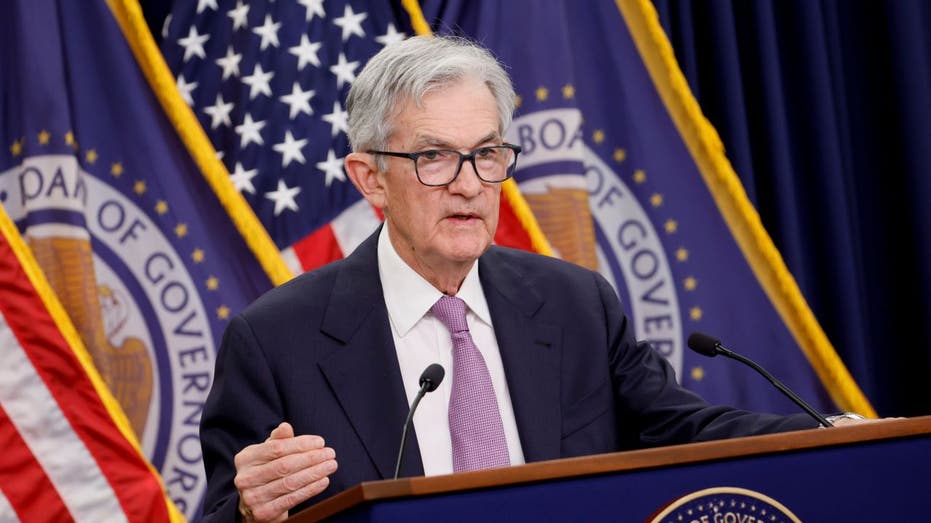The Digital Chamber founder and CEO Perianne Boring discusses Trump’s crypto agenda on ‘Mornings with Maria.’
President-elect Trump’s return to the White House will no doubt bring significant changes to the financial services industry as he rolls back many of the Biden administration’s policies.
While some of Trump’s agenda will be familiar from his first term, he added some planks to his platform during the last campaign that have already begun to reshape parts of the sector.
President-elect Trump speaks about the economy, inflation, and manufacturing during a campaign event at Alro Steel in Potterville, Michigan, on Aug. 29. (Bill Pugliano/Getty Images / Getty Images)
Erin Bryan, a partner at law firm Dorsey & Whitney and former in-house senior corporate counsel for one of the largest banks in the U.S., shared with FOX Business what lies ahead for the industry over the next four years.
For starters, Bryan says that when it comes to banking and financial services policy, the second Trump administration will likely resume its efforts to limit banking regulations.
WALL STREET BONUSES EXPECTED TO RISE FOR FIRST TIME SINCE 2021: REPORT
The attorney, whose regulatory compliance practice advises clients on anti-money laundering laws, electronic banking, financial technology, government examination and privacy, noted that over the past four years, banks have experienced a surge of new regulations and enforcement activity.
“The Biden administration’s rulemaking has continued at a strong pace despite the Supreme Court’s recent decisions limiting the powers of the administrative state,” Bryan said, referencing the overturning of the Chevron doctrine over the summer. “The industry is likely to see swift action to scale back the Biden administration’s rulemaking efforts given the new administration’s expressions of concern regarding over-regulation.”

Erin Bryan is a banking industry expert and partner at law firm Dorsey & Whitney. (Dorsey & Whitney / Fox News)
Bryan said that when President Trump returns to office, he will find a vastly different landscape than before, and because federal agencies have been severely impacted by recent Supreme Court decisions — including the end of Chevron — actions to drop pending rulemaking could have wide-ranging and long-lasting consequences.
MARKET IS WELCOMING NEWS OF TRUMP WIN: ‘THE REACTION IS CLEAR,’ STRATEGIST SAYS
The second Trump Administration is also likely to take a friendly approach to bank-fintech partnerships, bank merger proposals, bank charter applications and blockchain technologies, all of which encountered resistance over the past four years, she noted.
Trump’s embrace of cryptocurrencies has already been seen in the market in the days since he won the election a week ago. Bitcoin has hit repeated record-highs, which Bryan told FOX Business is directly related to investor expectations following the election results.
She pointed to Trump sending strong signals during his campaign that his administration would embrace cryptocurrencies.
For example, he launched crypto business World Liberty Financial, accepted campaign donations in the form of digital currencies, said he would make the U.S. the world’s “crypto capital” and even discussed the possibility of creating a bitcoin strategic reserve.
Professional Capital Management founder and CEO Anthony Pompliano explains why the price of bitcoin is surging to new highs on ‘Cavuto: Coast to Coast.’
Regulatory agencies that oversee the financial services sector are bracing for an upheaval under the new Trump administration.
“Leadership changes at the CFPB [Consumer Financial Protection Bureau] will almost certainly be made in short order,” Bryan said. “This will give President Trump an opportunity not only to course-correct the rulemaking and enforcement agendas of the CFPB and OCC [Office of the Comptroller of Currency], but also to gain two Republican votes on the FDIC [Federal Deposit Insurance Corporation] board.”
Bryan says all current rulemaking and policy proposals from the CFPB and FDIC are at risk of being placed on hold or abandoned altogether by the Trump administration, including everything from the open banking rule to guidance on overdraft fees to brokered deposits.
FED’S POWELL STAYING PUT EVEN IF TRUMP HAS ANOTHER IDEA
But one arena where Trump’s options are limited is with the Federal Reserve.

Jerome Powell, chairman of the U.S. Federal Reserve, speaks during a news conference following a Federal Open Market Committee meeting in Washington, D.C., on Nov. 7. (Ting Shen/Bloomberg via Getty Images / Getty Images)
Current leadership, including Federal Reserve Chair Jerome Powell and Vice Chair for Supervision Michael Barr, can only be replaced for cause.
GET FOX BUSINESS ON THE GO BY CLICKING HERE
“Still, if President Trump gains control of both the FDIC and OCC, the Federal Reserve’s joint agency proposals could face new roadblocks,” Bryan said. “It’s nearly impossible to imagine that new appointees who will be charged with implementing the president’s anti-regulation agenda would support the current Basel III endgame proposal.”














